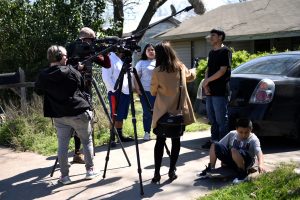
By Ian Simpson
WASHINGTON (Reuters) – A makeshift memorial made up of 7,000 pairs of shoes took shape on the lawn of the U.S. Capitol on Tuesday, as gun control activists dramatized the number of children killed in the United States by gunfire since the 2012 Sandy Hook school massacre.
The shoe demonstration comes a day before a massive nationwide walkout by students to demand tougher laws on gun ownership, part of a campaign that emerged after the killing of 17 students and staff at a Florida high school a month ago.
“This is really about putting the human cost of refusing to pass gun control at the doorstep of lawmakers,” said Emma Ruby-Sachs, deputy director of Avaaz, a U.S.-based civic organization that planned the shoe memorial. The Capitol is the home of the U.S. Congress.
Activists and volunteers gathered at dawn, placing 7,000 colorful pairs of donated children’s footwear side by side in a trapezoid shape to commemorate those who have died since the Sandy Hook elementary school shooting in Newtown, Connecticut.
Dozens of people were seen standing in front of the shoes, holding large, black signs with the words “#NOTONEMORE” and “7000 KIDS KILLED” written on them.
Donors to the shoe monument include actresses Susan Sarandon and Bette Midler, and talk show host Chelsea Handler.
Wednesday’s #ENOUGH National School Walkout, organized by the activists who helped plan the Women’s March in Washington for the past two years, will begin at 10 a.m. local time (1400 GMT).
Students across the country will walk out of their classrooms for 17 minutes to commemorate the 17 victims who lost their lives in the Feb. 14 shooting at Marjory Stoneman Douglas High School in Parkland, Florida.
The massacre was the deadliest school shooting since 20 children and six adults were shot dead at Sandy Hook more than five years ago.
About 1,300 people below the age of 18 are killed by gunfire in the United States every year, according to the U.S. Centers for Disease Control and Prevention.
The walkout has won the support of many school districts and civil rights organizations, including the American Civil Liberties Union. More than 2,500 walkouts are scheduled across the country, according to the organizer’s website.
Some schools will allow students to participate and have encouraged them to exercise their free speech rights under the First Amendment of the U.S. Constitution. A few have threatened to suspend students if they disrupt class by leaving.
“When students protest at schools, our school staff will respond appropriately and allow our students to be heard,” said Robert Runcie, superintendent for public schools for Broward County, Florida, where Parkland’s Marjory Stoneman is located.
Dozens of colleges and universities across the country, including at least three Ivy League schools, have said their application processes will not consider disciplinary action taken against high school students who engage in protests.
Tuesday’s shoe memorial is reminiscent of a monument on the Danube River near the Hungarian Parliament in Budapest commemorating thousands of people, including Jews, killed by fascists in the 1940s.
Many Canadian cities have marked the National Day of Remembrance and Action on Violence Against Women on Dec. 6 with similar “shoe memorials.”
(Additional reporting by Gina Cherelus in New York; Editing by Rosalba O’Brien and Bernadette Baum)









